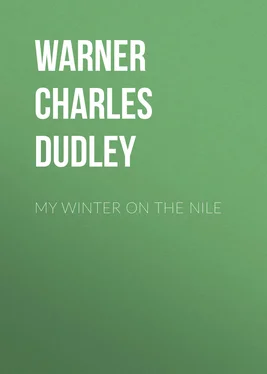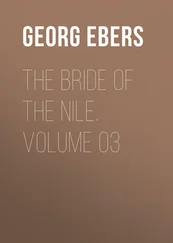Charles Warner - My Winter on the Nile
Здесь есть возможность читать онлайн «Charles Warner - My Winter on the Nile» — ознакомительный отрывок электронной книги совершенно бесплатно, а после прочтения отрывка купить полную версию. В некоторых случаях можно слушать аудио, скачать через торрент в формате fb2 и присутствует краткое содержание. Жанр: Путешествия и география, История, foreign_edu, foreign_antique, foreign_prose, на английском языке. Описание произведения, (предисловие) а так же отзывы посетителей доступны на портале библиотеки ЛибКат.
- Название:My Winter on the Nile
- Автор:
- Жанр:
- Год:неизвестен
- ISBN:нет данных
- Рейтинг книги:5 / 5. Голосов: 1
-
Избранное:Добавить в избранное
- Отзывы:
-
Ваша оценка:
- 100
- 1
- 2
- 3
- 4
- 5
My Winter on the Nile: краткое содержание, описание и аннотация
Предлагаем к чтению аннотацию, описание, краткое содержание или предисловие (зависит от того, что написал сам автор книги «My Winter on the Nile»). Если вы не нашли необходимую информацию о книге — напишите в комментариях, мы постараемся отыскать её.
My Winter on the Nile — читать онлайн ознакомительный отрывок
Ниже представлен текст книги, разбитый по страницам. Система сохранения места последней прочитанной страницы, позволяет с удобством читать онлайн бесплатно книгу «My Winter on the Nile», без необходимости каждый раз заново искать на чём Вы остановились. Поставьте закладку, и сможете в любой момент перейти на страницу, на которой закончили чтение.
Интервал:
Закладка:
The vender of under-garments says: “I gif you four franc for dis one. I gif you for dese two a seven franc. No? What you gif?”
A bright orange-boy, we ask, “How much a dozen?”
“Half franc.”
“Too much.”
“How much you give? Tast him; he ver good; a sweet orange; you no like, you no buy. Yes, sir. Tak one. This a one, he sweet no more.”
And they were sweet no more. They must have been lemons in oranges’ clothing. The flattering tongue of that boy and our greed of tropical color made us owners of a lot of them, most of which went overboard before we reached Alexandria, and would make fair lemonade of the streak of water we passed through.
At noon we sail away into the warm south. We have before us the beautiful range of Aspromonte, and the village of Reggio bear which in 1862 Garibaldi received one of his wounds, a sort of inconvenient love-pat of fame. The coast is rugged and steep. High up is an isolated Gothic rock, pinnacled and jagged. Close by the shore we can trace the railway track which winds round the point of Italy, and some of the passengers look at it longingly; for though there is clear sky overhead, the sea has on an ungenerous swell; and what is blue sky to a stomach that knows its own bitterness and feels the world sinking away from under it?
We are long in sight of Italy, but Sicily still sulks in the clouds and Mount Ætna will not show itself. The night is bright and the weather has become milder; it is the prelude to a day calm and uninteresting. Nature rallies at night, however, and gives us a sunset in a pale gold sky with cloud-islands on the horizon and palm-groves on them. The stars come out in extraordinary profusion and a soft brilliancy unknown in New England, and the sky is of a tender blue—something delicate and not to be enlarged upon. A sunset is something that no one will accept second-hand.
On the morning of December 1st., we are off Crete; Greece we have left to the north, and are going at ten knots an hour towards great hulking Africa. We sail close to the island and see its long, high barren coast till late in the afternoon. There is no road visible on this side, nor any sign of human habitation, except a couple of shanties perched high up among the rocks. From this point of view, Crete is a mass of naked rock lifted out of the waves. Mount Ida crowns it, snow-capped and gigantic. Just below Crete spring up in our geography the little islands of Gozo and Antigozo, merely vast rocks, with scant patches of low vegetation on the cliffs, a sort of vegetable blush, a few stunted trees on the top of the first, and an appearance of grass which has a reddish color.
The weather is more and more delightful, a balmy atmosphere brooding on a smooth sea. The chill which we carried in our bones from New York to Naples finally melts away. Life ceases to be a mere struggle, and becomes a mild enjoyment. The blue tint of the sky is beyond all previous comparison delicate, like the shade of a silk, fading at the horizon into an exquisite grey or nearly white. We are on deck all day and till late at night, for once enjoying, by the help of an awning, real winter weather with the thermometer at seventy-two degrees.
Our passengers are not many, but selected. There are a German baron and his sparkling wife, delightful people, who handle the English language as delicately as if it were glass, and make of it the most naïve and interesting form of speech. They are going to Cairo for the winter, and the young baroness has the longing and curiosity regarding the land of the sun, which is peculiar to the poetical Germans; she has never seen a black man nor a palm-tree. In charge of the captain, there is an Italian woman, whose husband lives in Alexandria, who monopolizes the whole of the ladies’ cabin, by a league with the slatternly stewardess, and behaves in a manner to make a state of war and wrath between her and the rest of the passengers. There is nothing bitterer than the hatred of people for each other on shipboard. When I afterwards saw this woman in the streets of Alexandria I had scarcely any wish to shorten her stay upon this earth. There are also two tough-fibered and strong-brained dissenting ministers from Australia, who have come round by the Sandwich Islands and the United States, and are booked for Palestine, the Suez Canal and the Red Sea. Speaking of Aden, which has the reputation of being as hot as Constantinople is wicked, one of them tells the story of an American (the English have a habit of fastening all their dubious anecdotes upon “an American”) who said that if he owned two places, one in Aden and the other in H–, he would sell the one in Aden. These ministers are distinguished lecturers at home—a solemn thought, that even the most distant land is subjected to the blessing of the popular lecture.
Our own country is well represented, as it usually is abroad, whether by appointment or self-selection. It is said that the oddest people in the world go up the Nile and make the pilgrimage of Palestine. I have even heard that one must be a little cracked who will give a whole winter to high Egypt; but this is doubtless said by those who cannot afford to go. Notwithstanding the peculiarities of so many of those one meets drifting around the East (as eccentric as the English who frequent Italian pensions ) it must be admitted that a great many estimable and apparently sane people go up the Nile—and that such are even found among Cook’s “personally conducted.”
There is on board an American, or a sort of Irish-American more or less naturalized, from Nebraska, a raw-boned, hard-featured farmer, abroad for a two-years’ tour; a man who has no guide-book or literature, except the Bible which he diligently reads. He has spent twenty or thirty years in acquiring and subduing land in the new country, and without any time or taste for reading, there has come with his possessions a desire to see that old world about which he cared nothing before he breathed the vitalizing air of the West. That he knew absolutely nothing of Europe, Asia, or Africa, except the little patch called Palestine, and found a day in Rome too much for a place so run down, was actually none of our business. He was a good patriotic American, and the only wonder was that with his qualification he had not been made consul somewhere.
But a more interesting person, in his way, was a slender, no-blooded, youngish, married man, of the vegetarian and vegetable school, also alone, and bound for the Holy Land, who was sick of the sea and otherwise. He also was without books of travel, and knew nothing of what he was going to see or how to see it. Of what Egypt was he had the dimmest notion, and why we or he or anyone else should go there. What do you go up the Nile for? we asked. The reply was that the Spirit had called him to go through Egypt to Palestine. He had been a dentist, but now he called himself an evangelist. I made the mistake of supposing that he was one of those persons who have a call to go about and convince people that religion is one part milk (skimmed) and three parts water—harmless, however, unless you see too much of them. Twice is too much. But I gauged him inadequately. He is one of those few who comprehend the future, and, guided wholly by the Spirit and not by any scripture or tradition, his mission is to prepare the world for its impending change. He is en rapport with the vast uneasiness, which I do not know how to name, that pervades all lands. He had felt our war in advance. He now feels a great change in the air; he is illuminated by an inner light that makes him clairvoyant. America is riper than it knows for this change. I tried to have him definitely define it, so that I could write home to my friends and the newspapers and the insurance companies; but I could only get a vague notion that there was about to be an end of armies and navies and police, of all forms of religion, of government, of property, and that universal brotherhood is to set in.
Читать дальшеИнтервал:
Закладка:
Похожие книги на «My Winter on the Nile»
Представляем Вашему вниманию похожие книги на «My Winter on the Nile» списком для выбора. Мы отобрали схожую по названию и смыслу литературу в надежде предоставить читателям больше вариантов отыскать новые, интересные, ещё непрочитанные произведения.
Обсуждение, отзывы о книге «My Winter on the Nile» и просто собственные мнения читателей. Оставьте ваши комментарии, напишите, что Вы думаете о произведении, его смысле или главных героях. Укажите что конкретно понравилось, а что нет, и почему Вы так считаете.












